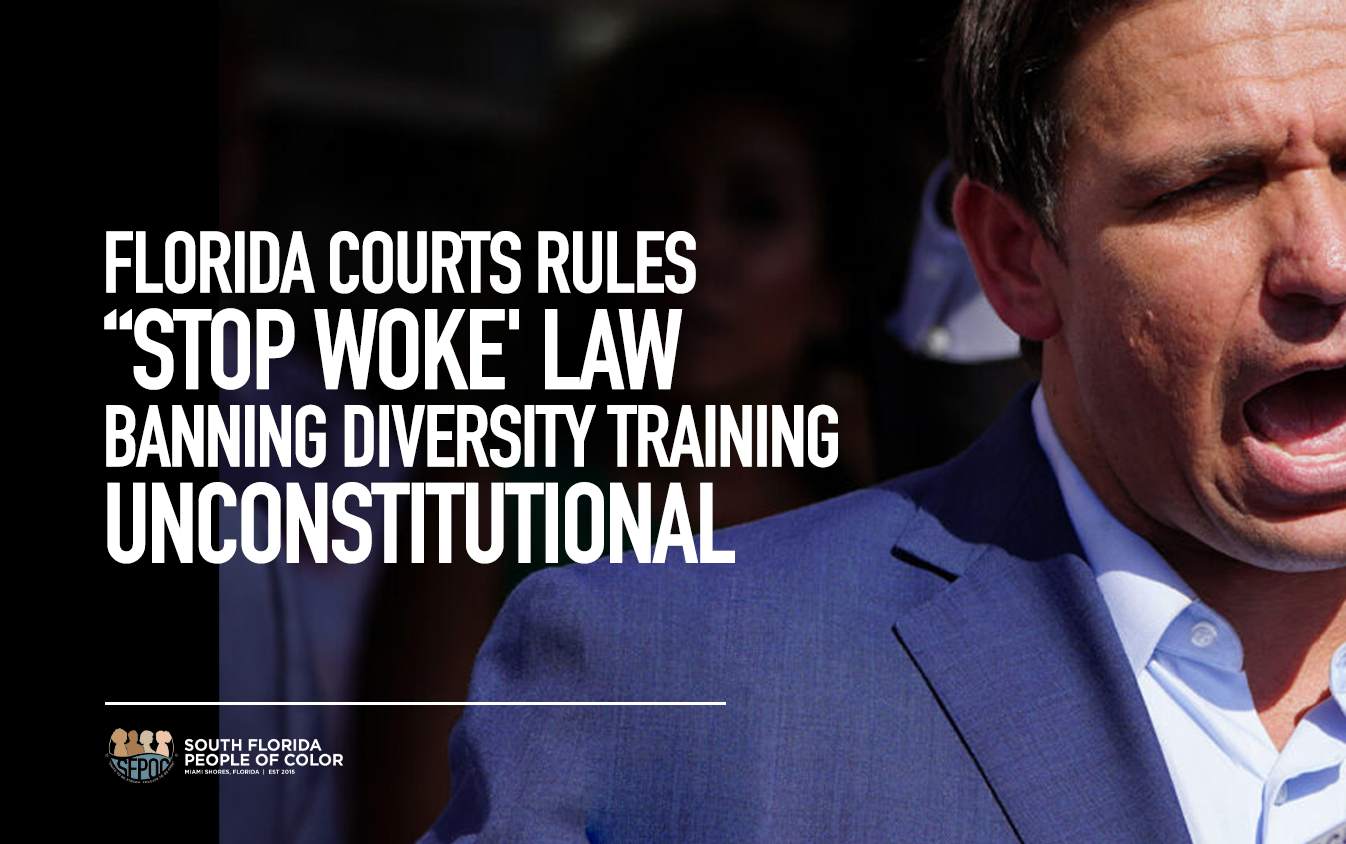We celebrate the recent decision in the case of Honeyfund.com, Inc. v. State of Florida, No. 22-13135 (Mar. 4, 2024), by the United States Eleventh Circuit Court of Appeals, declaring Florida’s “Stop W.O.K.E. Act” unconstitutional.

Named the “Individual Freedom Act” and signed into law by reactionary Governor Ron DeSantis in 2022, the Act made it unlawful for employers to host Diversity, Equity, and Inclusion (DEI)-oriented trainings that address what have been described as “banned concepts.” These banned concepts contest racial- and gender-based power and privilege and examine and disrupt the ways systems and institutions sustain and perpetuate these dynamics.
The provisions of the Act refer to “an individual,” “members of one race,” and “members of a particular race,” silently shouting the whiteness and maleness of those “individuals” and “members” in an extraordinary embodiment of the principle of the “strategic rhetoric” of whiteness.
As communications academics Thomas Nakayama and Robert Krizek help us understand, whiteness is deployed throughout and through the Act to maintain dominance and centrality by claiming neutrality and universality, while seeking and preserving invisibility. “Whiteness,” they explain, “wields power yet endures as a largely unarticulated position.”
Indeed, whiteness and maleness are the silent, domineering “default” frameworks propped up by the Stop W.O.K.E. Act (even the acronym refers to “Our [white] Kids.”), while its sole function is to prevent examination and contestation of these very facts.
The Eleventh Circuit to its credit held that the State of Florida cannot restrict the communication of ideas and concepts by private employers to their employees just because the Governor and Legislature disagree with them. Such restriction violates the free speech and free expression guarantees of the First Amendment to the United States Constitution.
Our celebration is muted because the very same restrictions ruled unconstitutional for employers remain in effect in Florida’s k-12 public schools. Similarly, uncertainty remains as to the application of these restrictions to Florida public higher education because, while a federal judge ruled the provisions unconstitutional and enjoined their application in November 2022, Pernell v. Florida Board of Governors of the State University System, No. 4:22cv304-MW/MAF (N. D. Fla. Nov. 17, 2022), that case remains on appeal before the Eleventh Circuit.
In the meantime, the legislature and Governor DeSantis have circumvented the Pernell injunction by passing another anti-DEI law, defunding university DEI initiatives at public universities.
We likewise hesitate to fulsomely celebrate the recent settlement between Equality Florida and the State of Florida, limiting the scope of Florida’s Parental Rights in Education, or “Don’t Say Gay,” law (protecting only “Christian” parental rights). The law’s problematic curricular restrictions remain in effect, though the settlement does clarify what teachers can and cannot say.
The infliction of curricular violence by the Stop W.O.K.E Act, by the Don’t Say Gay Act, and by attacks on so-called “Critical Race Theory,” DEI initiatives, and affirmative action, perpetuate Antiblack, Anti-LGBTQ, and other policy violence and sustain permission structures for the continued infliction of literal violence – like slavery, Jim Crow, lynching, criminal legal harm, and anti-LGBTQ violence – against which Carter G. Woodson warned nearly a century ago.
Even with limited legal relief, much of the harm is already done. The suppression of critical thought and transformative ideas has already infected the marketplace of mutual understanding, acutely so in the State of Florida. To undo the calamitous reverses wrought by these laws, we must re-commit to fugitive pedagogy, and combine this resistance with years of intensive and strategic organizing.
1. See § 760.10(8)(a), Fla. Stat.
2. Thomas K. Nakayama and Robert Krizek, Whiteness: A Strategic Rhetoric, Journal of Quarterly Speech 81 (1995) 291-309.
3. See § 1003.42(3), Fla. Stat.
4. See § 1005.05(4)(a)(1), Fla. Stat.
5. See § 1004.06(2)(b), Fla. Stat.
6. See § 1001.42(8)(C)(1)(3), Fla. Stat.
7. See Ibrahim X. Kendi, The Book That Exposed Anti-Black Racism in the Classroom (Feb 14, 2023), The Atlantic, (discussing Carter G. Woodson’s work, The Mis-Education of the Negro with Jared R. Givens, author of Fugitive Pedagogy: Carter G. Woodson and the Art of Black Teaching (2021).
8. Metaphorical “policy violence” is the term used by Bishop William Barber, II, the founder of the Poor People’s Campaign. See William J. Barber, II, America’s Moral Malady, The nation’s problem isn’t that we don’t have enough money. It’s that we don’t have the moral capacity to face what ails society, The Atlantic (Feb. 2018), https://www.theatlantic.com/magazine/archive/2018/02/a-new-poor-peoples-campaign/552503/ ; See also State Fact Sheets, (Florida), Poor People’s Campaign, https://www.poorpeoplescampaign.org/resource/factsheets/ (“From war to mass incarceration and beyond, these policies amplify poverty, racism and environmental degradation. They can and must change.”). Bishop Barber’s movement resurrects the movement by the same name, begun by Dr. Martin Luther King, Jr.’s just before his assassination in 1968.
9. See Carter G. Woodson, The Mis-Education of the Negro (1933).
10. See Jared R. Givens, Fugitive Pedagogy: Carter G. Woodson and the Art of Black Teaching (Harvard University Press 2021).
